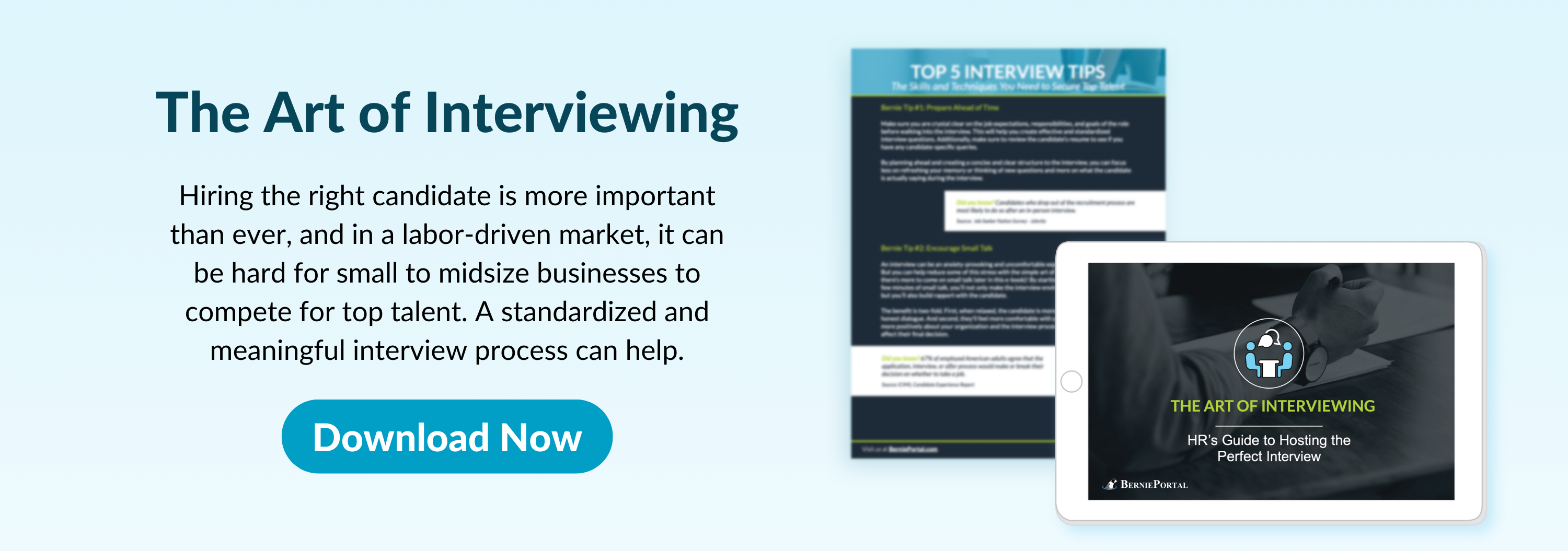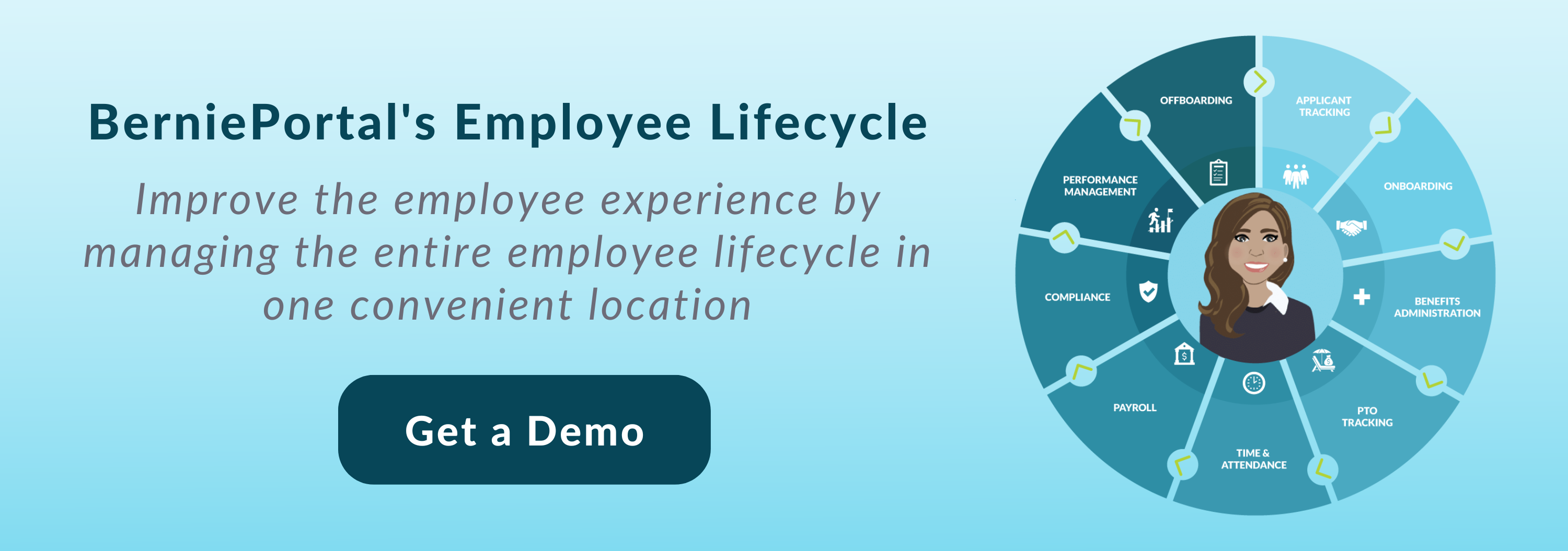
Written by
Katie Shpak
Katie is a content writer on the marketing team at BerniePortal. She writes about healthcare, human resources, and benefits.
Can You Revoke a Job Offer?

Let's say you hired Julie as a project manager for your company with a starting salary of $75k. A week before her first day, you receive this email from her:
Good morning,
Thank you again for the amazing opportunity to fulfill the project manager role at your company. I’m super excited to start! However, I did receive another job offer for a project management position at another company, and they have offered to pay me $83k. Working here is still my top choice, so I was wondering if you could just match the salary? That would be great!
Thank you so much. Please let me know if you have any questions.
Best,
Julie
Ok, so—what do you do? Do you offer her a 10% higher salary to match? Do you encourage her to accept the other offer? Do you tell her you aren’t willing to change the salary, but you’d still love to have her work for you? Seriously—what do you do?
I'll get to that soon! But first—let's go over whether or not it's acceptable to revoke a job offer.
Can You Revoke a Job Offer?
Have you ever hired someone, and then immediately knew it was the wrong decision? When an individual’s true colors shone through a TAD too late? Well—guess what? You CAN change your mind about hiring them.
You may be wondering, when would it be justified? When is it acceptable to change your mind about a new hire?
The simple answer is—when they take the opportunity away from themself. You may even need to push for it, as the hiring manager will often be too focused on the path of starting their recruiting process over to truly decide what’s best for the organization.
It’s important to make the distinction that you aren’t firing someone before they have a chance to prove themselves on day one; you are simply listening to their own reasons and actions to determine that they will not be a good fit for your organization.
To further explain what this means, I’m going to provide you with some more scenarios where this applies.
Scenario #1: The Truth Comes Out
You hire an employee to work in the office five days a week. Previously, he had been working a fully remote position. During the interview, you ask him if he is willing to come into the office every day, and his response is as follows,
“Oh, yes, absolutely! I hate working remotely. I like to be around people and get out of the house. I’m not even applying to any remote positions.”
You were satisfied with that response; it seemed genuine. The rest of the interview process had gone great, and the hiring manager believed he was the best candidate for the role. You’re both really looking forward to having him start in a couple weeks.
But then, an employee approaches you with something she noticed on Facebook. As the social media manager for the organization, she always follows new hires to get them engaged with the company page. However, after finding him on Facebook, she saw a series of status updates that read,
“Working remote is literally THE BEST. I can roll out of bed and sign on to work without even having to shower. 😂”
“I can’t imagine ever having to work in an office again. That would be so miserable.”
“Well…I lost my job. 😭If anyone knows of any remote positions available for account management positions, please let me know!”
“Y’all will never believe this. I just accepted a job FULLY in office, 5 days a week. What a joke. I needed the job, so I took it, but PLEASE message me if you know of anything remote!!!”
Yikes…that certainly is not what he relayed during the interview, and this is QUITE an issue. Not only does he appear to have blatantly lied, but it also seems pretty clear that he doesn’t intend on staying at the company very long. He’d be out the door with the first remote position offered to him. Additionally, he could openly discuss his favor of remote work in the office, harming the current culture that exists.
So—what do you do?
It is MORE than acceptable not to go through with the hire. The best way to handle this situation is to pick up the phone and give him a call. It’s important that this conversation take place via phone, as it’s more direct and doesn’t leave a platform for rebuttals and excuses. Make the conversation brief and to the point. It can go as follows,
“Hi [name]. It has been brought to my attention that your Facebook account has a series of posts regarding your love for remote work. It seems very clear that you are unhappy with a position that requires you to be in the office, especially five days a week, so we have decided that you aren’t the best fit for the role. We wish you all the best in finding the job that’s right for you.”
Make it succinct, and don’t pause and leave opportunities for backtalk. It’s likely that he would try to interject and make excuses for those actions. If that does happen, you can simply say, “I understand, but we have made our decision. Best of luck.” You can then end the call.
You shouldn’t feel bad for making this decision. It’s important to recognize that the employee misled you during the interview. If you had seen his social media comments before the interview, would you have even gone through with meeting him? Probably not.
Let’s jump into another scenario.
Scenario #2: Not The Right ADD
Here at BerniePortal, we have something called the “figure-it-out” factor.
Let’s face it; your boss can’t help you with every little detail, nor should they. Let’s say Paula is hired, and her start date is in two weeks. After accepting the role, Paula emails her boss an excessive amount of questions, which include:
“How do I get to the office? Can you send me directions?”
“How’s traffic? When should I leave to get to work on time”?
“I’m confused on how to set up my direct deposit. Can we walk through this on my first day?”
“I don’t understand how to sign my documents electronically. Can I just sign them in person?”
“I have some questions about my benefits, and I was wondering if I can send them over to you now?”
After patiently responding to Paula’s questions, you address the last question as follows, “We will go over your benefits on the first day, but I have attached the documents you need, which address everything you need to know.”
Paula then responds with, “Thank you so much for sending these my way! After receiving them, I still have some questions, and I’d love clarity before my first day. It’s just easier for me to have the answers now.”
She then proceeds to send over her follow-up questions.
First, you’re probably listening to this, thinking, “Wow—how annoying! I wouldn’t have time to deal with that.” And yes, it is extremely annoying and frustrating, and you probably do not have the time. But additionally, it’s also not a good sign for how Paula would handle her actual role once she starts. Is she going to ask the same degree of questions every day? Is she able to figure anything out on her own? How much of her manager’s day, and yours, is going to get sidetracked by her inability to find answers on her own?
There’s a degree of questioning that is acceptable, but then there’s mothering and hand-holding, Which has its place! At home, with their mother. Not at work.
You want to hire adds that are going to help move your business forward. Someone like Paula would not only have no part in moving the business forward, but she also could hold people back. While she seemed like a good hire during the interview process, you’re having serious second thoughts. Here’s what you can do:
- Talk to the hiring manager. See how they feel about the excessive questioning, and warn them that the questioning will likely continue when Paula starts in her role.
- Have the hiring manager call up Paula. They can have a candid conversation about the “figure-it-out” culture expected within the organization. The hiring manager should ask Paula if this is something she can handle.
A decision can be made based on the responses Paula gives within that conversation. There is no right or wrong choice in this scenario. Every situation is going to be different, and the hiring managers need to make the decision that makes the most sense at the moment.
At BerniePortal, we use our onboarding feature to get signatures on documents like our Culture Guide, which has the answers to many of the first-day questions new hires may ask. Having this document available to new hires in advance SHOULD save you valuable time. However, if that new hire is like Paula, and is STILL bombarding you with questions that are outlined in your Culture Guide, then you know they won’t use the tools at their disposal within their role, and therefore lack the “figure-it-out” factor you need.
The main point is that you CAN choose to part ways with a new hire prior to the start date in this type of situation.
Scenario #3: They Begin to Add Parameters
Let's look back at that email from Julie, who was hired as a project manager with a starting salary of $75k.
Good morning,
Thank you again for the amazing opportunity to fulfill the project manager role at your company. I’m super excited to start! However, I did receive another job offer for a project management position at another company, and they have offered to pay me $83k. Working here is still my top choice, so I was wondering if you could just match the salary? That would be great!
Thank you so much. Please let me know if you have any questions.
Best,
Julie
Did she continue interviewing after she accepted the role at your company? Or, was the interview beforehand? Does it matter?
Let’s address your options again, and discuss the consequences that could arise from each.
- You match the offer that Julie requests.
When Julie starts working, she may fill her coworkers in on her hiring process, letting them know that she asked for a higher salary and received it. This may cause some employees to get upset with their current pay and start also asking for a higher salary. Or perhaps, they would begin looking into companies that offer more for the same role, as Julie did. There is also the chance that Julie fabricated the scenario about being offered more, just to get a higher salary. This would make Julie manipulative and feel vindicated that she has power over you.
-
You encourage Julie to accept the other offer.
It’s likely that the need to fill the role and get started on large projects is imperative. If you encourage Julie to accept the other offer, that means you have to go back through the interview process to fill the role, and projects will be delayed further. Additionally, the hiring manager may become more frustrated, as they are the ones feeling the pain of the empty role more acutely.
-
You tell Julie that you aren’t willing to adjust her salary, but you’d still love to have her work for you.
1. Julie may decline and choose to pursue the other company, or
2. Julie agrees to still work at your company at the original agreed upon salary. She may be annoyed that her ask was declined, and it may create awkwardness and tension when she begins in her role.
If you do choose not to go forward with Julie’s hire and part ways, here is some language you can use.
Pick up the phone and give Julie a call. ALWAYS do this over the phone to eliminate the chance for unnecessary email responses. The conversation should go something as follows,
“Hi Julie. I saw your email - CONGRATULATIONS! We’re happy for you and that opportunity - just wanted to call and wish you all the best. Maybe our paths will cross again in the future, but until then, best of luck.”
If Julie attempts to interject to say she’d really rather be with your company, shut it down, nicely. Express again that you’re happy for her, and reiterate that you wish her all the best and that maybe your paths will cross again in the future. The conversation does not need to continue after the point has been made, so you can end the call.
If Julie is really assertive, you may need to explain that your company doesn’t respond well to re-negotiating agreements that have already been made, but that you understand she likely had her reasons, which you respect, and that you really do wish. her. all. the. best.
Each decision you make will have pros and cons. It is up to you and the hiring managers to analyze the situation and come to a decision where the pros will outweigh the cons.
Additional Resources
You can also stay informed, educated, and up-to-date with Form W-2 and other important topics by using BerniePortal’s comprehensive resources:
- BernieU—free online HR courses, approved for SHRM and HRCI recertification credit
-
BerniePortal Blog—a one-stop-shop for HR industry news
-
HR Glossary—featuring the most common HR terms, acronyms, and compliance
-
HR Guides—essential pillars covering an extensive list of comprehensive HR topics
-
HR Party of One—our popular YouTube series and podcast, covering emerging HR trends and enduring HR topics

Written by
Katie Shpak
Katie is a content writer on the marketing team at BerniePortal. She writes about healthcare, human resources, and benefits.





Submit a Comment